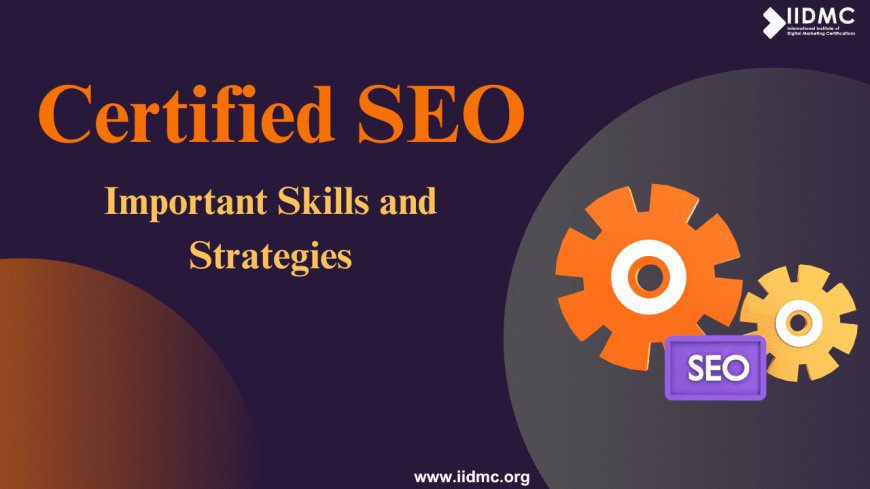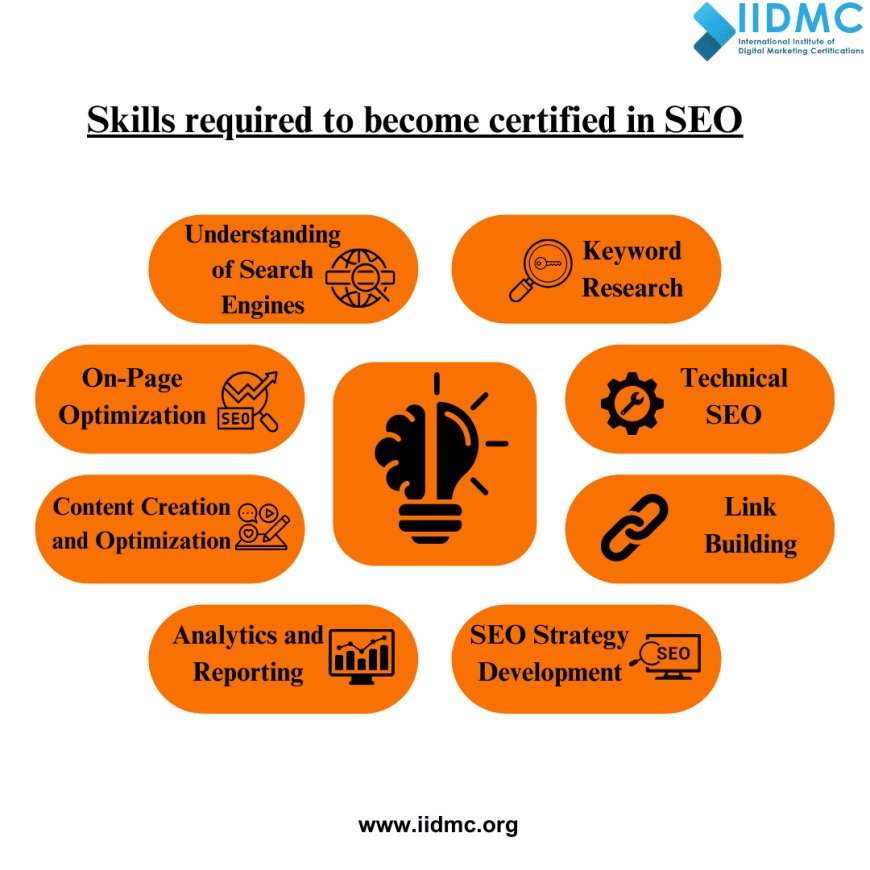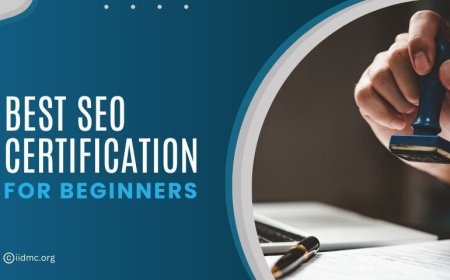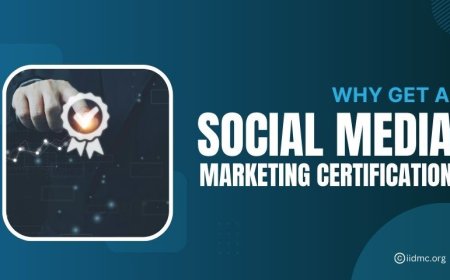Certified SEO: Important Skills and Strategies
Master the skills and strategies for SEO certification. Optimize sites, boost rankings, drive organic traffic with our expert guide

Digital marketing requires SEO to optimize websites for greater organic search engine rankings. It shapes plans to draw in targeted traffic and establish credibility, and it's essential for corporate success and online visibility. Effective SEO not only increases visibility but also strengthens user trust and brand authority in today's competitive landscape. This economical strategy encourages consistent growth and client interaction while blending in perfectly with other marketing initiatives. SEO is still essential when algorithms change because it helps companies engage with their customers more successfully by producing high-quality content and providing optimal user experiences.
SEO's Importance in Digital Marketing:
1. Increased Visibility and Brand Awareness: Search engine optimization (SEO) raises your website's position in search engine results, increasing its visibility to prospective clients who are actively looking for goods or services linked to your company. In addition to increasing organic traffic, this improved visibility strengthens brand familiarity and credibility.
2. Cost-Effective Marketing Strategy: Because SEO concentrates on organic traffic rather than paid advertising, which charges for each click or impression, it is a long-term, financially advantageous investment. Resources may be needed for the initial setup and optimization, but with time, the advantages may outweigh the expenses.
3. Targeted Traffic and Quality Leads: Search engine optimization (SEO) focuses on people who are actively looking for particular goods, services, or business-related information. Search engine optimization (SEO) draws highly focused traffic that is more likely to become leads or customers by optimizing for relevant keywords and producing quality content.
4. Establishes Credibility and Authority: Users frequently view high search engine ranks as a vote of confidence. Visibility of your website in search results tells users that your company is reputable and well-known in its field. Users are more likely to interact with your content or make a purchase as a result of this increased trust.
5. Long-Term Sustainability: SEO is a long-term approach that keeps producing results, in contrast to short-term marketing techniques. Maintaining your place when you rise in the rankings and gain credibility takes constant work, but it can have long-term advantages without requiring more advertising expenditure.
The Developing Environment of Search Engine Optimization (SEO):
Technological developments and shifting user behavior are driving a constant evolution in the field of Search Engine Optimization (SEO). These days, SEO places a strong emphasis on user experience, content relevancy, and technological performance in addition to more conventional strategies like link development and keyword optimization. The rise of voice search, AI-driven algorithms, and mobile-first indexing are just a few of the changes that have changed SEO strategies. Additionally, Google stresses the value of excellent user experiences and high-quality content through its Core Web Vitals and E-A-T (Expertise, Authoritativeness, Trustworthiness) initiatives.
The Challenges that Marketers Face in Monitoring SEO Trends:
For marketers, staying current with SEO developments poses a number of challenges:
-
Algorithm Updates: Search engines, such as Google, regularly make changes to their algorithms that impact the rankings of their results. Marketers need to stay up to date on these developments so they may modify their plans as necessary.
-
Technical Difficulty: Structured data, mobile adaptability, and website optimization are examples of technical elements that SEO encompasses. For marketers to successfully apply these, they require technical know-how or assistance.
-
material Quality and Relevance: Constant work and resources are needed to produce high-quality, appropriate content that meets user intent and follows SEO best practices.
-
Competitive Landscape: Companies in competitive sectors frequently have to contend with intense competition for the top search engine rankings, which calls for constant innovation and optimization.
-
Resource Allocation: For businesses on limited funds, SEO success necessitates the investment of time, energy, and occasionally cash in tools, content production, and technical advancements.
Commonly Placed Myths About SEO Techniques:
It is vital for marketers to understand and dispute current misconceptions regarding SEO techniques in order to formulate efficacious and enduring approaches. These misconceptions include the following: believing that SEO is a one-time event rather than a continuous process; seeing SEO as a one-time effort instead of an ongoing one; disregarding user experience in favor of search engine algorithms; and anticipating instant or assured benefits from SEO efforts. Marketers may take an extensive strategy focusing on high-quality content, user-focused design, and ongoing optimization in line with modern SEO best practices by recognizing these difficulties and myths. By building user involvement and trust, this strategy not only improves search engine results but also supports long-term success in digital marketing.

What are the essential skills required to become certified in SEO?
To become certified in SEO, one must possess a few key skill sets:
-
Understanding of Search Engines: It is essential to have a basic understanding of search engines' algorithms and updates. This involves understanding elements such as crawling, indexing, and ranking.
-
Keyword Research: Ability to find suitable keywords with a sufficient amount of searches and degree of competition.
-
On-Page Optimization: On-page optimization refers to the process of improving a website's content, internal linking, title tags, meta descriptions, headers, and URL structure for search engines.
-
Technical SEO: Skill in areas such as mobile optimization, crawlability, crawl speed, crawlable websites, and schema markup implementation.
-
Content Creation and Optimization: The capacity to produce interesting, high-quality material that meets with search engine optimization guidelines, meets user needs, and organically incorporates desired keywords.
-
Link Building: Gaining high-quality backlinks from reliable websites, increasing domain authority, and raising search engine ranks are all possible with an understanding of link building techniques.
-
Analytics and Reporting: Expertise in monitoring performance, analyzing data, and extracting insights for optimization through the use of SEO tools such as Search Console, Google Analytics, and other SEO platforms.
-
SEO Strategy Development: Ability to create thorough SEO strategies that are in line with business objectives while taking user behavior, competitive analysis, and industry trends into account.
-
Collaboration and Communication: Proficiency in communication to work with developers, marketers, and content marketers to ensure that SEO techniques are smoothly incorporated into larger marketing campaigns.
In conclusion, digital marketers that want to successfully travel the cutthroat online environment of today must grasp the art and science of SEO. Through understanding of fundamental skills including technical search engine optimization, content optimization, and strategic planning, marketers can leverage search engines to improve long-term visibility, draw in targeted traffic, and establish brand credibility. Maintaining a current understanding of SEO trends, adjusting to algorithmic modifications, and dispelling errors are essential for developing SEO strategies which produce quantifiable outcomes. In the end, including SEO into a more comprehensive digital marketing plan guarantees that companies in the ever-changing realm of online marketing not only survive, but develop.





























